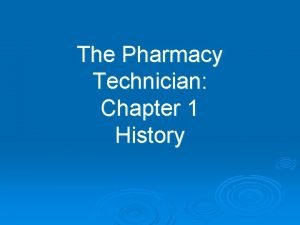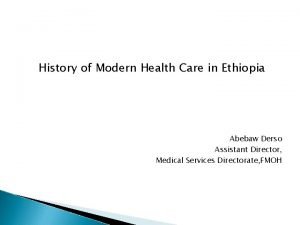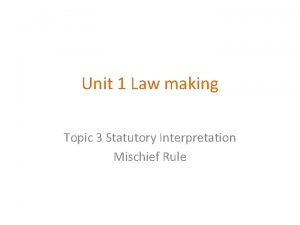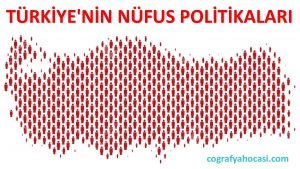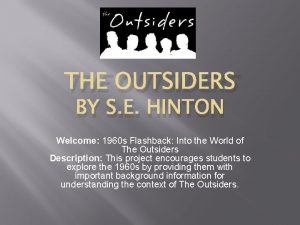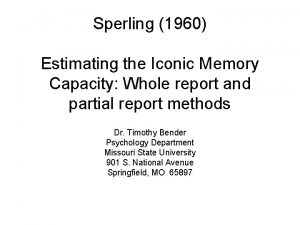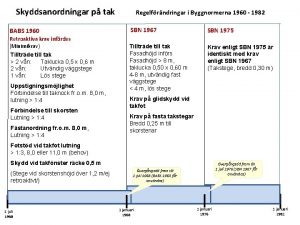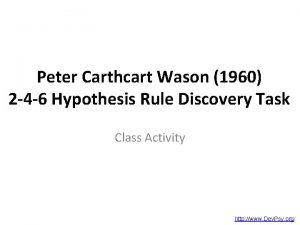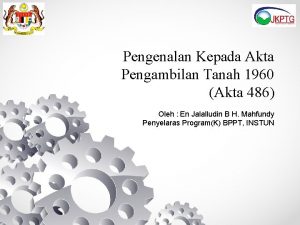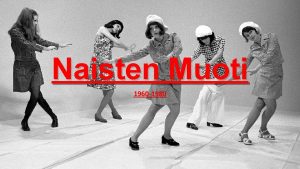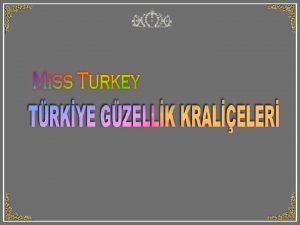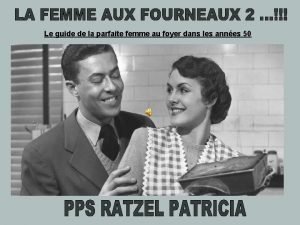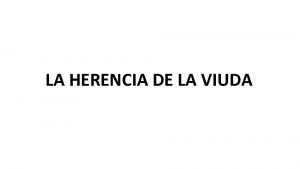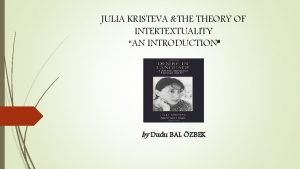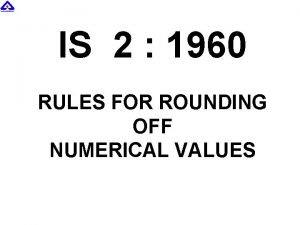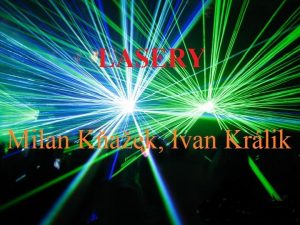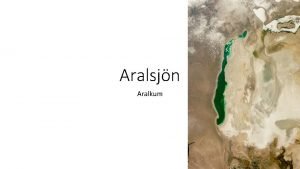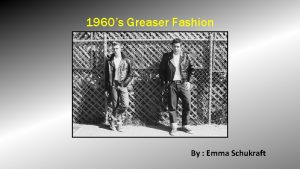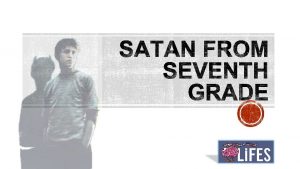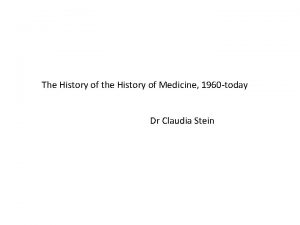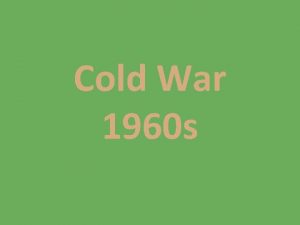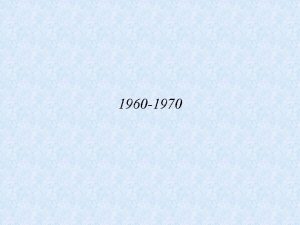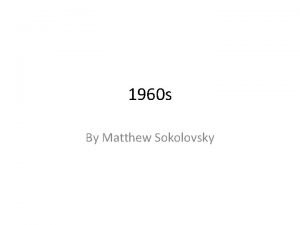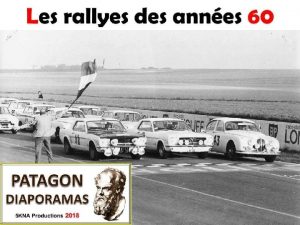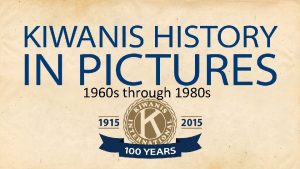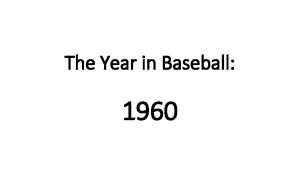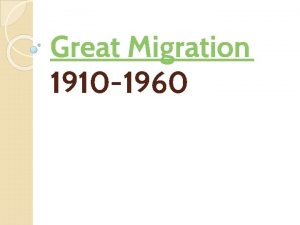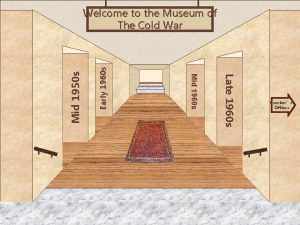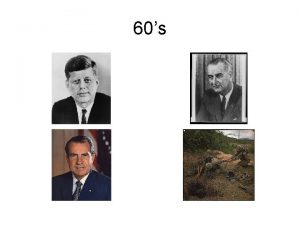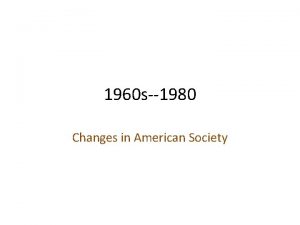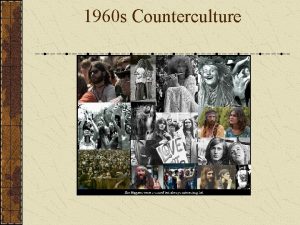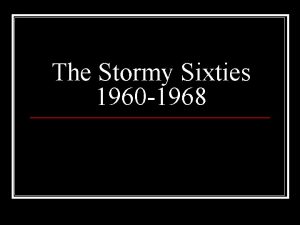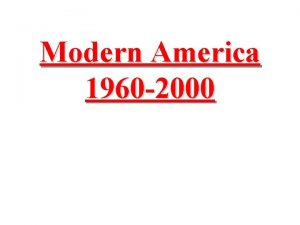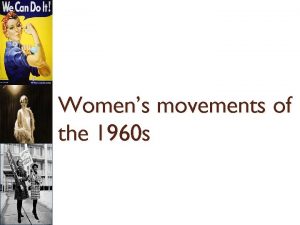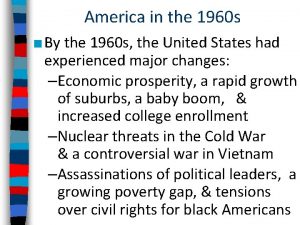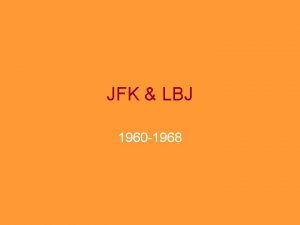The History of the History of Medicine 1960

























- Slides: 25

The History of the History of Medicine, 1960 -today Dr Claudia Stein

‘Historiography’ has two meanings: • A body of work written on a specific topic (i. e. the historiography of the history of anatomy) • the study of theories and methodology used by historians and the development of history writing as an academic discipline.

Theory: A theory is a system of assumptions, principles, and relationships posited to explain a specified set of phenomena. (For example, Michel Foucault’s theories of power/knowledge) Methodology: A methodology is often a whole set of methods developed according to a theory about how best to research and learn about natural or social phenomena. (For example,

Sudhoff founded the first Institute for the History of Medicine in Leipzig in 1906 Karl Sudhoff, 1853 -1938

Director at John Hopkins University Institute for the History of Medicine, 1932 -1937 He is in ‘social medicine’ (medicine for all) and is fascinated by the medical system of the USSR Henry E. Sigerist, 1891 -1897

History of Medicine before 1960 s: • the analysis of text (very much focused on classical medicine; not material or visual objects) • on ‘thinking’ rather then medical ‘practice’ • on ‘great men’, great doctors; progressive development of the medical profession • a celebratory story of ‘progress’ and ‘discoveries’

Everything changes in the 1960 s and 70 s…… Women’s liberation movement

Founding members of ‘Our Bodies Ourselves’ of the Boston Women’s Collective


Vaginal self-examination groups as a way to explore the female body and defy male medical domination over it

Various medical scandals…….

Thalidomide Scandal 1960 s

This leads to an Increasing critique of the medical profession and a questioning of the ‘great hero’ and progress stories Niklas Jewson, ‘The Disappearance of the Sick Man from Medical Cosmology’, Sociology, 10 (1976), 225 -44 Ivan Illich, Limits to Medicine (1976); -- Medicial Nemesis: The Expropritation of Health (1974) Influence of neo-Marxist understandings of power and historical development; everything is based on economic structures of a given society; suppression of the working classes (proletaria) (by the elites (bourgeoisie), doctors are part of the supressing system This neo-Marxist view is reflected in the term: Medicalisation the process by which nonmedical human conditions and problems (being gay, or having a liking for alcohol) come to be treated as a biological condition, and thus turned into subjects of medical study.

Characteristics of the ‘new’ social history of medical history in the 1960 s: • On the political left; neo-Marxist, this has effect on their understanding of how power works (from above, related to the productive forces; alienation from the ‘real’ medicine and the ‘real’ body through the professional establishment, patient voice is ‘silenced’ by profession) • A tendency to use sociology as an inspiration and method for work (quantitative data, sociological models and theories) • Medical history as a way ‘to empower’ those who are suppressed (women, indigenous groups etc. )

The ‘new’ social history of medicine is also shaped by developments in wider history writing in the 1960 s and 1970 s: the history ‘from below’ The Making of the English Working Class, 1963 Aimed at discovering the ‘experience’ of the poor and neglected in history Re-discovery of historical narrative and a turn away from sociology Historians turn to anthropology…. Edward Palmer Thompson, 1924 -1993

‘Cultural Turn’ from the 1980 Anthropology the study of humans, past and present. It aims to understand the complexity of cultures across all of human history and thus draws and builds upon knowledge from the social and biological sciences as well as the humanities and physical sciences. Influential is the work of the American anthropologist: Clifford Geertz, ’ Thick Description: Towards an Interpretative Theory of Culture’, in ibid, The Interpretation of Culture: Selected Essays (1973) Major impact on the history of medicine: Arthur Kleinmann, Patients and Healers in the Context of Culture (1980)

The ‘new’ cultural history of medicine Roy Porter, 1946 -2002 ‘The Patient’s View: A History from Below’ – excellent example to see how scholars moved from the ‘new’ social history of medicine to the cultural history of medicine

Lingustic Turn: Analytical turn upon, or problematisation of words/language used in a given field of study. Also used to refer to the ‘turn’ to linguistic philosophy in the late 20 th century in the humanities and social sciences.

Cours de linguistique générale (1916) Ferdinand de Saussure, 1857 -1913 Lingustics: scientific study of language in broadl three aspects: language form, language meanin and language in context

During the ‘lingustic turn’ Saussure’s ideas were applied to the understanding of wider human culture; central claims became : v Reality is unrepresentable in any form of human culture (whether written, spoken, visual or dramatic) v No authoritative account can exists of anything. Nobody can know everything, and there is never one authority on a given subject

Postmodern history writing: the most influential philosopher Michel Foucault 1926 -1984

Foucault’s philosophical works are all ‘histories’ and most of them deal with the medicine and the life sciences from the Middle Ages to the present (1980 s) Central Claims: • power is always directed at the human body ( • power aims to make it docile and obedient • Medicine/life sciences are central players in these games of power over the human body • Medical/life sciences knowledge is not ‘neutral’ or ‘objective’ but part of the complex nexus of ‘power/knowledge’ • Scientific/medical knowledge is not universally true; knowledge is not ‘discovered’ but constructed in a specific society

History writing as a ‘critique of the present’

From these claims develop a new area of study in the history of medicine: The History of the Body

Where are we now? • • • Global approaches (global cultural history of medicine) Medicine and health consumption/consumerism Material and visual culture of medicine Animals and the history of medicine The history of emotion (developed out of the history of the body)
 Chapter 1 history of medicine and pharmacy
Chapter 1 history of medicine and pharmacy Modern medicine in ethiopia
Modern medicine in ethiopia Corkery v carpenter 1951
Corkery v carpenter 1951 Coğrafya hocası.com
Coğrafya hocası.com Joubert v tarry
Joubert v tarry S.e. hinton 1960s
S.e. hinton 1960s Sperling 1960
Sperling 1960 Babs 1960
Babs 1960 Pop art 1950-1960
Pop art 1950-1960 Wason 1960
Wason 1960 Akta pengambilan tanah 1960 (akta 486)
Akta pengambilan tanah 1960 (akta 486) 1960 luku muoti
1960 luku muoti Türkiye güzeli gizem memiç
Türkiye güzeli gizem memiç Manuel de la parfaite femme au foyer 1960
Manuel de la parfaite femme au foyer 1960 2da de reyes 4
2da de reyes 4 Intertextuality
Intertextuality Is 2:1960
Is 2:1960 Fotoluminiscencia
Fotoluminiscencia 1960s food
1960s food Dubai 1960 and now
Dubai 1960 and now Elles sont trop chou
Elles sont trop chou Michael heizer city
Michael heizer city Aralsjön 1960
Aralsjön 1960 1960s greaser fashion
1960s greaser fashion Cimbaj
Cimbaj Satan from the seventh grade
Satan from the seventh grade
